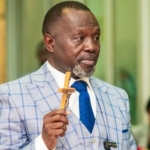
The Supreme Court has been asked to order the refund of all sums taken from the Consolidated Fund to finance the National Cathedral project because it was undertaken without prior approval of the Speaker of Parliament and the Chairperson of the Council of State, contrary to Article 179(11) of the Constitution of Ghana.
A citizen, Jonathan Amable of Unity Lodge, Anloga, in the Volta Region, is challenging the legality of the government’s financing of the construction of the National Cathedral from the Consolidated Fund.
It would be recalled that the construction of the National cathedral project was one of the fiercely contested issues leading up to the 2024 elections, with leading members of the then opposition National Democratic Party accusing the then Finance Minister, Mr Ken Ofori-Atta, of breaching the 1992 Constitution by releasing funds from the Consolidated Fund to finance the construction of the Cathedral without parliamentary approval.
These allegations came to a head when Mr. Ofori-Atta was hauled before Parliament in November 2022 to address questions at a hearing related to a motion of censure against him for this alleged unconstitutional conduct.
During his appearance, Mr. Ofori-Atta denied any wrongdoing, stating that the National Cathedral project was financed through money allocated to the Contingency Vote under previously approved budgets and Appropriation Acts.
Amable takes issue with this response, alleging that article 179(11) of the 1992 Constitution regulates expenditure made from Contingency Vote under the “Other Government Obligations” section of appropriation bills, which deals with money to be appropriated without being classified under a specific programme or activity.
Amable argues that article 179(2) of the 1992 Constitution requires the Government to submit to Parliament, estimates for all its planned expenditure and these planned expenditures must be duly classified in the relevant appropriation bills under related programmes and activities, for full transparency on what these funds are to be used for.
He argues further that as an exception to the classification requirement under article 179(2), article 179(11) authorises the government to appropriate money which is not related to a specific item of expenditure, subject to the control and supervision of a committee consisting of the President, Speaker of Parliament and Chairperson of the Council of State.
Amable submits that Mr. Ofori-Atta’s submission that the Cathedral project was financed from Contingency Vote is an admission that he acted unconstitutionally because this expenditure was not approved by the Committee set up under article 179(11).
He wants a declaration that the expenditure was unlawful and all persons who received the unconstitutional funds should be made to return them to the State.
However, the Attorney-General has in a response filed in July 2025, defended the actions of the outgone Finance Minister.
In a statement of defence filed in response to Amable’s claims, the Attorney General says the finances for the construction of the National Cathedral were approved by Parliament through the various budgets presented by the outgone Minister of Finance from 2018 to 2021.
The Attorney-General has therefore requested the court to dismiss Amable’s plea for the declaratory order and the consequential order for all the funds to be returned to the State.
This position of the AG marks a 180 degree turn from the position maintained by the Minority Caucus when they hauled Mr Ofori-Atta before Parliament in 2022.
Issues regarding the legality of the National Cathedral project featured prominently in the campaign of the incumbent National Democratic Congress government.
Mr. Amable’s suit also challenges the government’s statutory borrowing framework.
Among others, Amable is asking the Supreme Court to declare that several provisions within key financial laws — including the Bank of Ghana Act, 2002 (Act 612), the Public Financial Management Act, 2016 (Act 921), and the Public Financial Management Regulations, 2019 (L.I. 2378) — are inconsistent with Articles 181 (3), (4) and (6) of the Constitution, which requires parliamentary approval for borrowings contracted by the State.
The Attorney-General, however, disagrees that there is anything wrong with the provisions cited by Mr. Amable.
Amable’s claims
The plaintiff contends that the terms and conditions under government’s current borrowing regime — including loans, domestic and international bonds, notes and bills, as well as other debt instruments — must be approved by Parliament as stipulated in Articles 181(3), 181(4), and 181(6) of the Constitution.
He claims that in spite of this unambiguous constitutional provisions, the relevant legislation being impugned do not require the Government to submit key terms such as interest rates and the rights of debt holders to Parliament for approval.
He is, therefore, seeking several declarations and consequential orders, including:
• A declaration that Section 30 of the Bank of Ghana Act (as amended) and Section 61 of the Public Financial Management Act contravene Article 181(4);
• A declaration that Regulations 105, 108, and 109(2) of the Public Financial Management Regulations, 2019 (L.I. 2378), are unconstitutional; and
• An order striking out the impugned provisions from the relevant laws.
Mr. Amable is also challenging the US$10 billion COVID-19 Relief Bond transaction between the Ministry of Finance and the Bank of Ghana, executed under an asset purchase programme, describing it as unconstitutional.
Attorney-General’s Response
The Attorney-General’s Office in its statement of case opposing the suit, argues that the provisions cited by the plaintiff are lawful and consistent with the Constitution.
Again, it will be recalled that the then minority caucus, led by Mr Cassiel Ato Forson and Mahama Ayariga, took issue with the then Governor of the Bank of Ghana and the Finance Minister over alleged financing of the central government budget by the Bank of Ghana without prior parliamentary approval.
The Supreme Court is expected to set a date for full hearing after preliminary legal exchanges (Memorandum of Issues) between the parties.